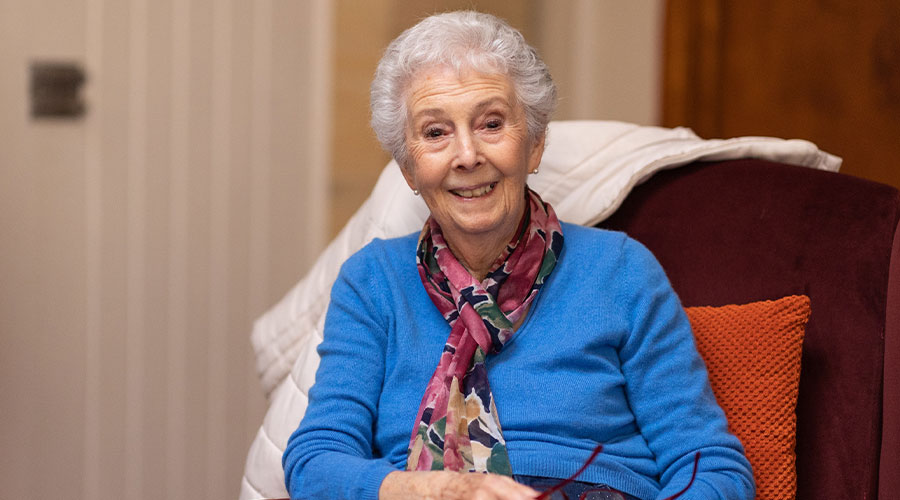- A
- A
- A
Music Therapy
We’re dedicated to enhancing the quality of later life through the power of music therapy
What is music therapy?
Music therapy is a form of creative arts therapy that uses music as a medium to enhance the wellbeing of people of all ages and abilities. It involves a qualified music therapist using clinical, music-based interventions to help people express their emotions, communicate, support emotional wellbeing, and improve their cognitive and physical functioning.
Enhancing later life
At MHA, we are passionate about enhancing the quality of life for older people through accessing music therapy. Since the foundation of our music therapy service in 2008, we have grown to a team of 30 highly-skilled music therapists, who deliver individual and group sessions across our homes and schemes throughout Great Britain.
Our music therapy sessions are free of charge for care home residents, thanks to the generous donations from our supporters. In each session, our experienced music therapists use their therapeutic skills to engage with residents by sharing live music, using singing, percussion, musical cues, and expressive communication. Sessions also use conversation and digital music technology when appropriate.
Supporting people living with dementia
We work with people to support healthy, active aging. A large part of our work is currently with people living with a diagnosis of dementia, and the team has an in-depth understanding of the challenges that surround this aspect of aging.
Music therapy can help people with dementia to relieve stress, express emotions, and connect with others. The music therapy team collaborate with care colleagues to understand and respond to residents’ evolving needs, developing strategies to help with positive and person-centred relationships.
The power of music
Music can evoke many different emotions and memories. Music is a useful way of supporting: autonomy; personal, cultural and sexual identification; choices and preferences and experiences. Music Therapists tap into all of this, providing a skilled clinical intervention for those identified as having specific needs.
Our Music Strategy sets out how music and music therapy enables residents and members to live later life well, as well as how it plays an important role for family members, colleagues, and engagement with the wider community.
Frequently Asked Questions (FAQs)
Music therapy can have many positive effects on the health and wellbeing of older people, especially those living with dementia. Some of the benefits include:
- Reducing distress behaviour
- Reducing depression
- Enhancing memory, attention, and communication
- Stimulating creativity and self-expression
- Improving mood, confidence, and self-esteem
- Providing social connection and enjoyment
- Encourages mobility and improved muscle tone.
No, musical skills are not needed to participate in music therapy sessions. Our therapists are trained to use music in a variety of ways to meet the individual needs of the people we work with.
Sessions are free of charge for residents It is funded thanks to the generous charitable support of people like you. To find out how to support this life-enhancing service please visit our donation page>
MHA residents and members can be referred for music therapy by themselves and anyone in their wider circle of care.
Music therapists are trained allied health professionals, who have completed a Master's degree in Music Therapy. They must also be registered with the Health and Care Professions Council (HCPC).
We are committed to participating in rigorous research projects, generating evidence about the beneficial impact of music therapy. This helps us to campaign for music therapy to be part of daily care provision and to influence policy making.
We have previously collaborated with with Anglia Ruskin University which contributed to the development of the MHA music therapy programme. We have also worked with Music For Dementia and Casio Music UK, trialling a keyboard for use by people living with dementia and their carers.
We are working in collaboration with Middlesex and other European universities to deliver the MusiCare study investigating whether music therapy has benefits for cognitive abilities and healthy ageing.
If you have questions about music therapy at MHA, please feel free to email our music therapy team at: Music.Therapy@mha.org.uk
If you'd like more general information about music therapy click the links below.

Support us
Our life-enhancing music therapy is only made possible through our charitable donations and fundraising.
Donate Now